Critical Analysis: Organisational Justice, Motivation, and Well-being
VerifiedAdded on 2023/06/07
|9
|2059
|93
Essay
AI Summary
This essay critically evaluates organisational justice as a form of motivation and its relationship with organisational well-being. It discusses how organisational justice, encompassing distributive, procedural, and interactional aspects, influences employee perceptions of fairness and impacts their motivation and overall well-being. The essay references studies exploring the connection between organisational justice and factors like job satisfaction, safety climate, and psychological well-being. Some studies suggest that fair practices and policies foster a positive work environment, enhancing motivation and well-being, while others emphasize the psychological and interpersonal aspects of fairness perceptions. The essay concludes that organisational justice is a significant aspect for ensuring a stable and trustworthy work environment, with employee perceptions of fairness playing a crucial role in motivation, performance, and well-being. Desklib offers a platform to explore similar essays and solved assignments.
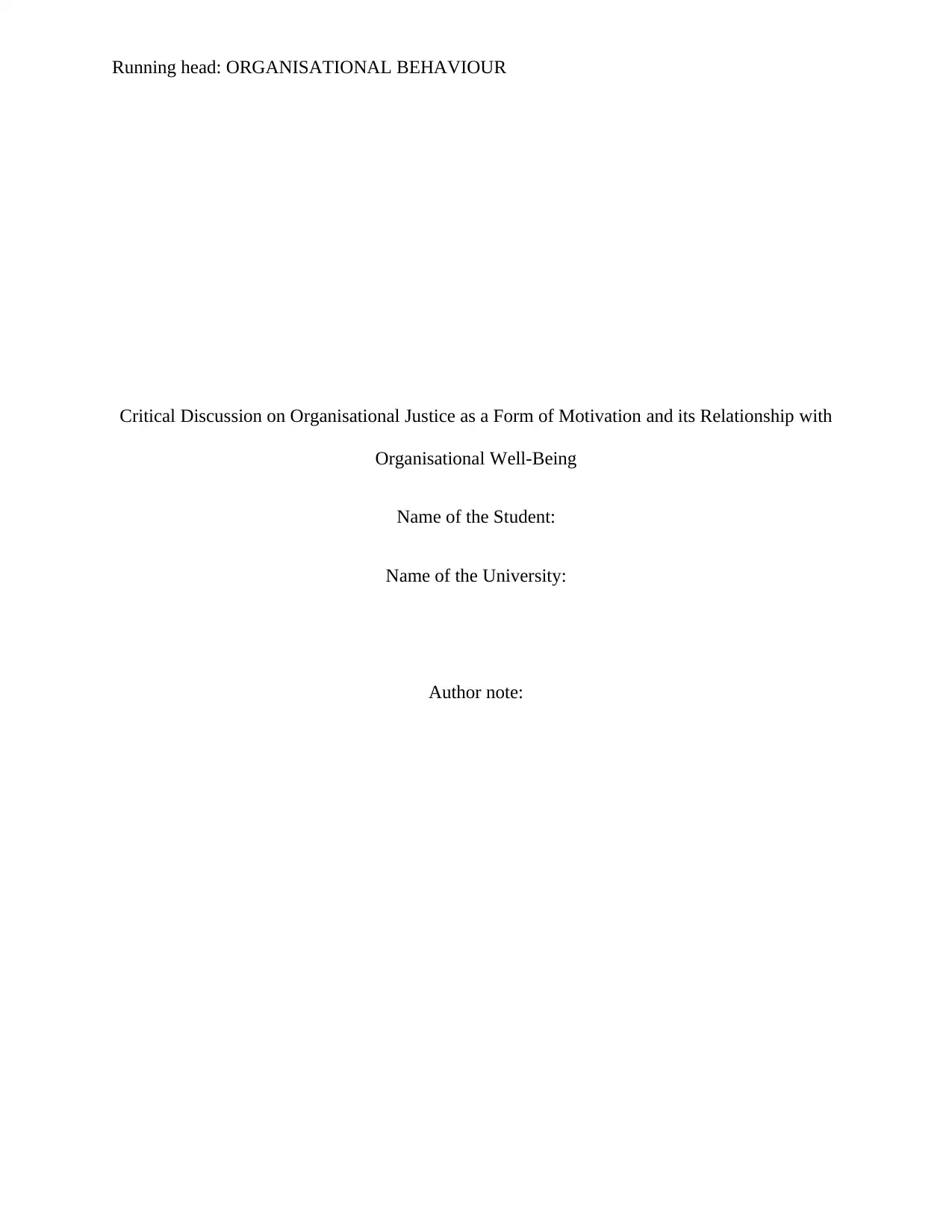
Running head: ORGANISATIONAL BEHAVIOUR
Critical Discussion on Organisational Justice as a Form of Motivation and its Relationship with
Organisational Well-Being
Name of the Student:
Name of the University:
Author note:
Critical Discussion on Organisational Justice as a Form of Motivation and its Relationship with
Organisational Well-Being
Name of the Student:
Name of the University:
Author note:
Paraphrase This Document
Need a fresh take? Get an instant paraphrase of this document with our AI Paraphraser
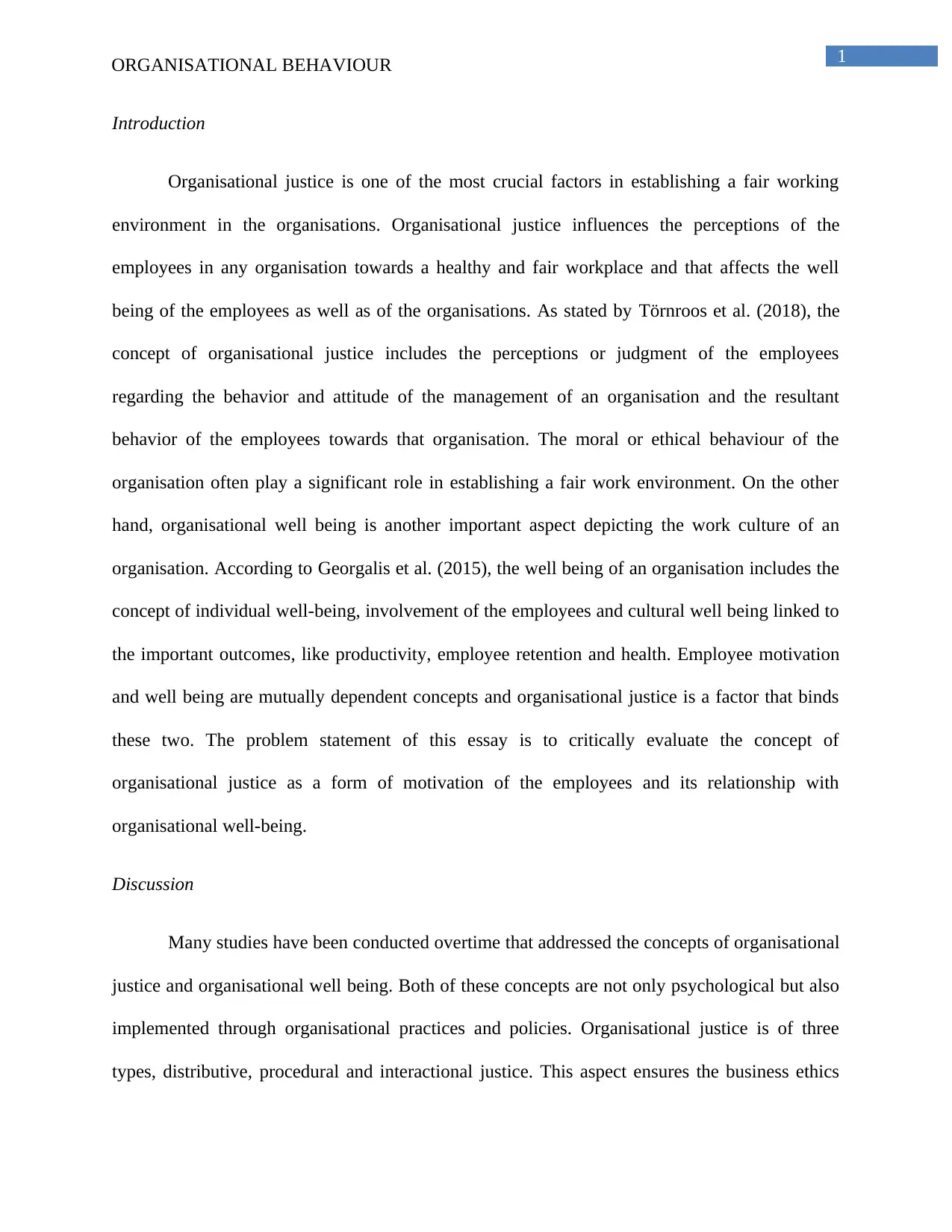
1ORGANISATIONAL BEHAVIOUR
Introduction
Organisational justice is one of the most crucial factors in establishing a fair working
environment in the organisations. Organisational justice influences the perceptions of the
employees in any organisation towards a healthy and fair workplace and that affects the well
being of the employees as well as of the organisations. As stated by Törnroos et al. (2018), the
concept of organisational justice includes the perceptions or judgment of the employees
regarding the behavior and attitude of the management of an organisation and the resultant
behavior of the employees towards that organisation. The moral or ethical behaviour of the
organisation often play a significant role in establishing a fair work environment. On the other
hand, organisational well being is another important aspect depicting the work culture of an
organisation. According to Georgalis et al. (2015), the well being of an organisation includes the
concept of individual well-being, involvement of the employees and cultural well being linked to
the important outcomes, like productivity, employee retention and health. Employee motivation
and well being are mutually dependent concepts and organisational justice is a factor that binds
these two. The problem statement of this essay is to critically evaluate the concept of
organisational justice as a form of motivation of the employees and its relationship with
organisational well-being.
Discussion
Many studies have been conducted overtime that addressed the concepts of organisational
justice and organisational well being. Both of these concepts are not only psychological but also
implemented through organisational practices and policies. Organisational justice is of three
types, distributive, procedural and interactional justice. This aspect ensures the business ethics
Introduction
Organisational justice is one of the most crucial factors in establishing a fair working
environment in the organisations. Organisational justice influences the perceptions of the
employees in any organisation towards a healthy and fair workplace and that affects the well
being of the employees as well as of the organisations. As stated by Törnroos et al. (2018), the
concept of organisational justice includes the perceptions or judgment of the employees
regarding the behavior and attitude of the management of an organisation and the resultant
behavior of the employees towards that organisation. The moral or ethical behaviour of the
organisation often play a significant role in establishing a fair work environment. On the other
hand, organisational well being is another important aspect depicting the work culture of an
organisation. According to Georgalis et al. (2015), the well being of an organisation includes the
concept of individual well-being, involvement of the employees and cultural well being linked to
the important outcomes, like productivity, employee retention and health. Employee motivation
and well being are mutually dependent concepts and organisational justice is a factor that binds
these two. The problem statement of this essay is to critically evaluate the concept of
organisational justice as a form of motivation of the employees and its relationship with
organisational well-being.
Discussion
Many studies have been conducted overtime that addressed the concepts of organisational
justice and organisational well being. Both of these concepts are not only psychological but also
implemented through organisational practices and policies. Organisational justice is of three
types, distributive, procedural and interactional justice. This aspect ensures the business ethics
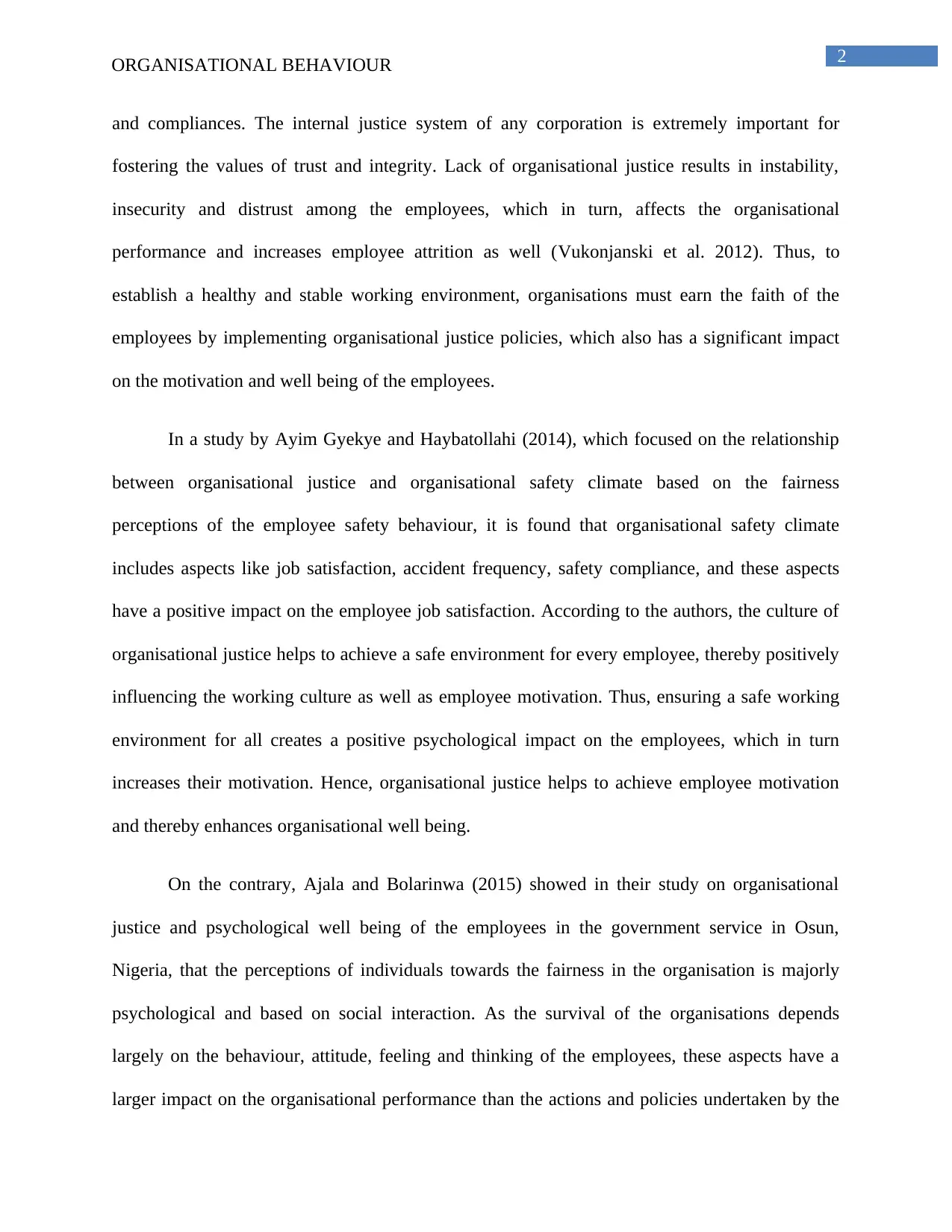
2ORGANISATIONAL BEHAVIOUR
and compliances. The internal justice system of any corporation is extremely important for
fostering the values of trust and integrity. Lack of organisational justice results in instability,
insecurity and distrust among the employees, which in turn, affects the organisational
performance and increases employee attrition as well (Vukonjanski et al. 2012). Thus, to
establish a healthy and stable working environment, organisations must earn the faith of the
employees by implementing organisational justice policies, which also has a significant impact
on the motivation and well being of the employees.
In a study by Ayim Gyekye and Haybatollahi (2014), which focused on the relationship
between organisational justice and organisational safety climate based on the fairness
perceptions of the employee safety behaviour, it is found that organisational safety climate
includes aspects like job satisfaction, accident frequency, safety compliance, and these aspects
have a positive impact on the employee job satisfaction. According to the authors, the culture of
organisational justice helps to achieve a safe environment for every employee, thereby positively
influencing the working culture as well as employee motivation. Thus, ensuring a safe working
environment for all creates a positive psychological impact on the employees, which in turn
increases their motivation. Hence, organisational justice helps to achieve employee motivation
and thereby enhances organisational well being.
On the contrary, Ajala and Bolarinwa (2015) showed in their study on organisational
justice and psychological well being of the employees in the government service in Osun,
Nigeria, that the perceptions of individuals towards the fairness in the organisation is majorly
psychological and based on social interaction. As the survival of the organisations depends
largely on the behaviour, attitude, feeling and thinking of the employees, these aspects have a
larger impact on the organisational performance than the actions and policies undertaken by the
and compliances. The internal justice system of any corporation is extremely important for
fostering the values of trust and integrity. Lack of organisational justice results in instability,
insecurity and distrust among the employees, which in turn, affects the organisational
performance and increases employee attrition as well (Vukonjanski et al. 2012). Thus, to
establish a healthy and stable working environment, organisations must earn the faith of the
employees by implementing organisational justice policies, which also has a significant impact
on the motivation and well being of the employees.
In a study by Ayim Gyekye and Haybatollahi (2014), which focused on the relationship
between organisational justice and organisational safety climate based on the fairness
perceptions of the employee safety behaviour, it is found that organisational safety climate
includes aspects like job satisfaction, accident frequency, safety compliance, and these aspects
have a positive impact on the employee job satisfaction. According to the authors, the culture of
organisational justice helps to achieve a safe environment for every employee, thereby positively
influencing the working culture as well as employee motivation. Thus, ensuring a safe working
environment for all creates a positive psychological impact on the employees, which in turn
increases their motivation. Hence, organisational justice helps to achieve employee motivation
and thereby enhances organisational well being.
On the contrary, Ajala and Bolarinwa (2015) showed in their study on organisational
justice and psychological well being of the employees in the government service in Osun,
Nigeria, that the perceptions of individuals towards the fairness in the organisation is majorly
psychological and based on social interaction. As the survival of the organisations depends
largely on the behaviour, attitude, feeling and thinking of the employees, these aspects have a
larger impact on the organisational performance than the actions and policies undertaken by the
⊘ This is a preview!⊘
Do you want full access?
Subscribe today to unlock all pages.

Trusted by 1+ million students worldwide
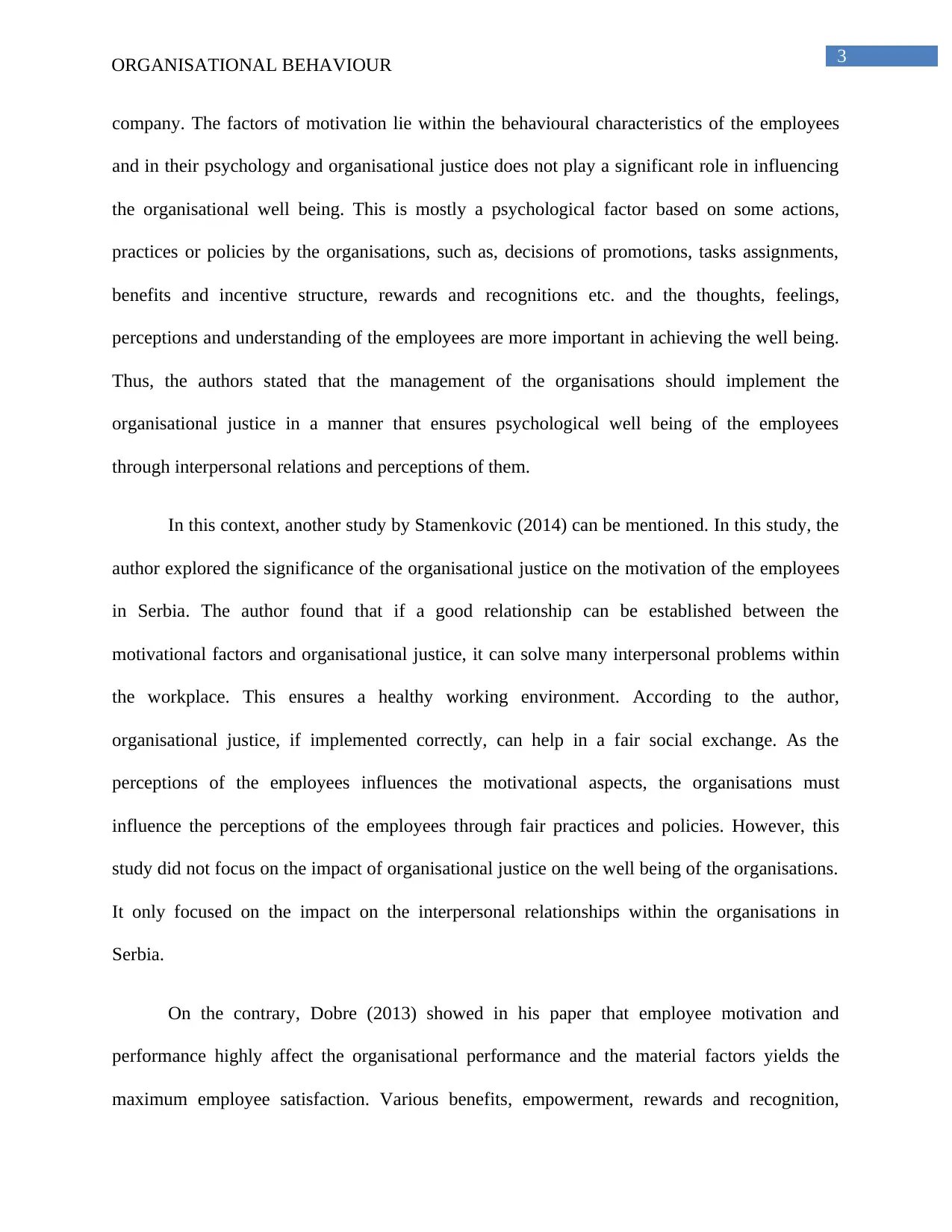
3ORGANISATIONAL BEHAVIOUR
company. The factors of motivation lie within the behavioural characteristics of the employees
and in their psychology and organisational justice does not play a significant role in influencing
the organisational well being. This is mostly a psychological factor based on some actions,
practices or policies by the organisations, such as, decisions of promotions, tasks assignments,
benefits and incentive structure, rewards and recognitions etc. and the thoughts, feelings,
perceptions and understanding of the employees are more important in achieving the well being.
Thus, the authors stated that the management of the organisations should implement the
organisational justice in a manner that ensures psychological well being of the employees
through interpersonal relations and perceptions of them.
In this context, another study by Stamenkovic (2014) can be mentioned. In this study, the
author explored the significance of the organisational justice on the motivation of the employees
in Serbia. The author found that if a good relationship can be established between the
motivational factors and organisational justice, it can solve many interpersonal problems within
the workplace. This ensures a healthy working environment. According to the author,
organisational justice, if implemented correctly, can help in a fair social exchange. As the
perceptions of the employees influences the motivational aspects, the organisations must
influence the perceptions of the employees through fair practices and policies. However, this
study did not focus on the impact of organisational justice on the well being of the organisations.
It only focused on the impact on the interpersonal relationships within the organisations in
Serbia.
On the contrary, Dobre (2013) showed in his paper that employee motivation and
performance highly affect the organisational performance and the material factors yields the
maximum employee satisfaction. Various benefits, empowerment, rewards and recognition,
company. The factors of motivation lie within the behavioural characteristics of the employees
and in their psychology and organisational justice does not play a significant role in influencing
the organisational well being. This is mostly a psychological factor based on some actions,
practices or policies by the organisations, such as, decisions of promotions, tasks assignments,
benefits and incentive structure, rewards and recognitions etc. and the thoughts, feelings,
perceptions and understanding of the employees are more important in achieving the well being.
Thus, the authors stated that the management of the organisations should implement the
organisational justice in a manner that ensures psychological well being of the employees
through interpersonal relations and perceptions of them.
In this context, another study by Stamenkovic (2014) can be mentioned. In this study, the
author explored the significance of the organisational justice on the motivation of the employees
in Serbia. The author found that if a good relationship can be established between the
motivational factors and organisational justice, it can solve many interpersonal problems within
the workplace. This ensures a healthy working environment. According to the author,
organisational justice, if implemented correctly, can help in a fair social exchange. As the
perceptions of the employees influences the motivational aspects, the organisations must
influence the perceptions of the employees through fair practices and policies. However, this
study did not focus on the impact of organisational justice on the well being of the organisations.
It only focused on the impact on the interpersonal relationships within the organisations in
Serbia.
On the contrary, Dobre (2013) showed in his paper that employee motivation and
performance highly affect the organisational performance and the material factors yields the
maximum employee satisfaction. Various benefits, empowerment, rewards and recognition,
Paraphrase This Document
Need a fresh take? Get an instant paraphrase of this document with our AI Paraphraser
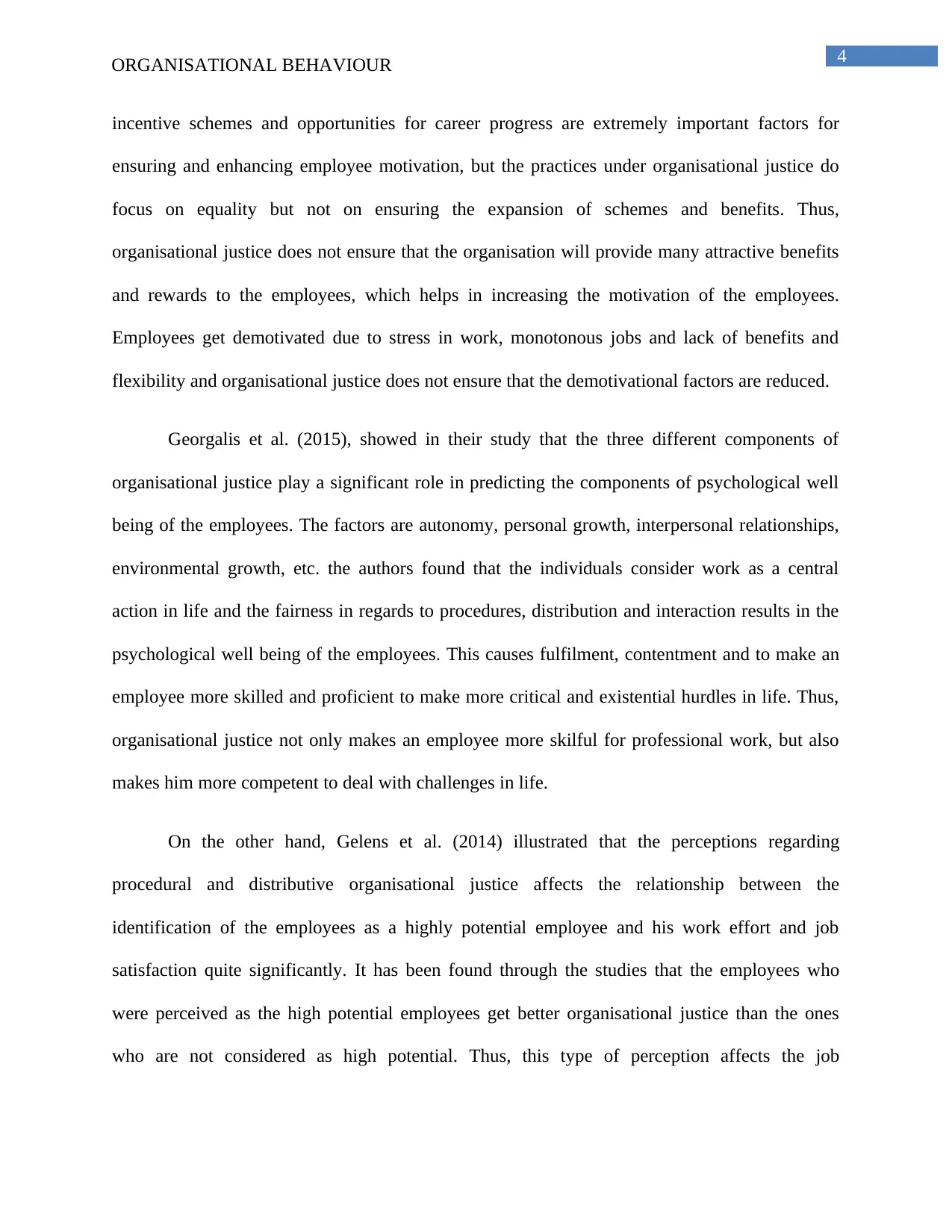
4ORGANISATIONAL BEHAVIOUR
incentive schemes and opportunities for career progress are extremely important factors for
ensuring and enhancing employee motivation, but the practices under organisational justice do
focus on equality but not on ensuring the expansion of schemes and benefits. Thus,
organisational justice does not ensure that the organisation will provide many attractive benefits
and rewards to the employees, which helps in increasing the motivation of the employees.
Employees get demotivated due to stress in work, monotonous jobs and lack of benefits and
flexibility and organisational justice does not ensure that the demotivational factors are reduced.
Georgalis et al. (2015), showed in their study that the three different components of
organisational justice play a significant role in predicting the components of psychological well
being of the employees. The factors are autonomy, personal growth, interpersonal relationships,
environmental growth, etc. the authors found that the individuals consider work as a central
action in life and the fairness in regards to procedures, distribution and interaction results in the
psychological well being of the employees. This causes fulfilment, contentment and to make an
employee more skilled and proficient to make more critical and existential hurdles in life. Thus,
organisational justice not only makes an employee more skilful for professional work, but also
makes him more competent to deal with challenges in life.
On the other hand, Gelens et al. (2014) illustrated that the perceptions regarding
procedural and distributive organisational justice affects the relationship between the
identification of the employees as a highly potential employee and his work effort and job
satisfaction quite significantly. It has been found through the studies that the employees who
were perceived as the high potential employees get better organisational justice than the ones
who are not considered as high potential. Thus, this type of perception affects the job
incentive schemes and opportunities for career progress are extremely important factors for
ensuring and enhancing employee motivation, but the practices under organisational justice do
focus on equality but not on ensuring the expansion of schemes and benefits. Thus,
organisational justice does not ensure that the organisation will provide many attractive benefits
and rewards to the employees, which helps in increasing the motivation of the employees.
Employees get demotivated due to stress in work, monotonous jobs and lack of benefits and
flexibility and organisational justice does not ensure that the demotivational factors are reduced.
Georgalis et al. (2015), showed in their study that the three different components of
organisational justice play a significant role in predicting the components of psychological well
being of the employees. The factors are autonomy, personal growth, interpersonal relationships,
environmental growth, etc. the authors found that the individuals consider work as a central
action in life and the fairness in regards to procedures, distribution and interaction results in the
psychological well being of the employees. This causes fulfilment, contentment and to make an
employee more skilled and proficient to make more critical and existential hurdles in life. Thus,
organisational justice not only makes an employee more skilful for professional work, but also
makes him more competent to deal with challenges in life.
On the other hand, Gelens et al. (2014) illustrated that the perceptions regarding
procedural and distributive organisational justice affects the relationship between the
identification of the employees as a highly potential employee and his work effort and job
satisfaction quite significantly. It has been found through the studies that the employees who
were perceived as the high potential employees get better organisational justice than the ones
who are not considered as high potential. Thus, this type of perception affects the job
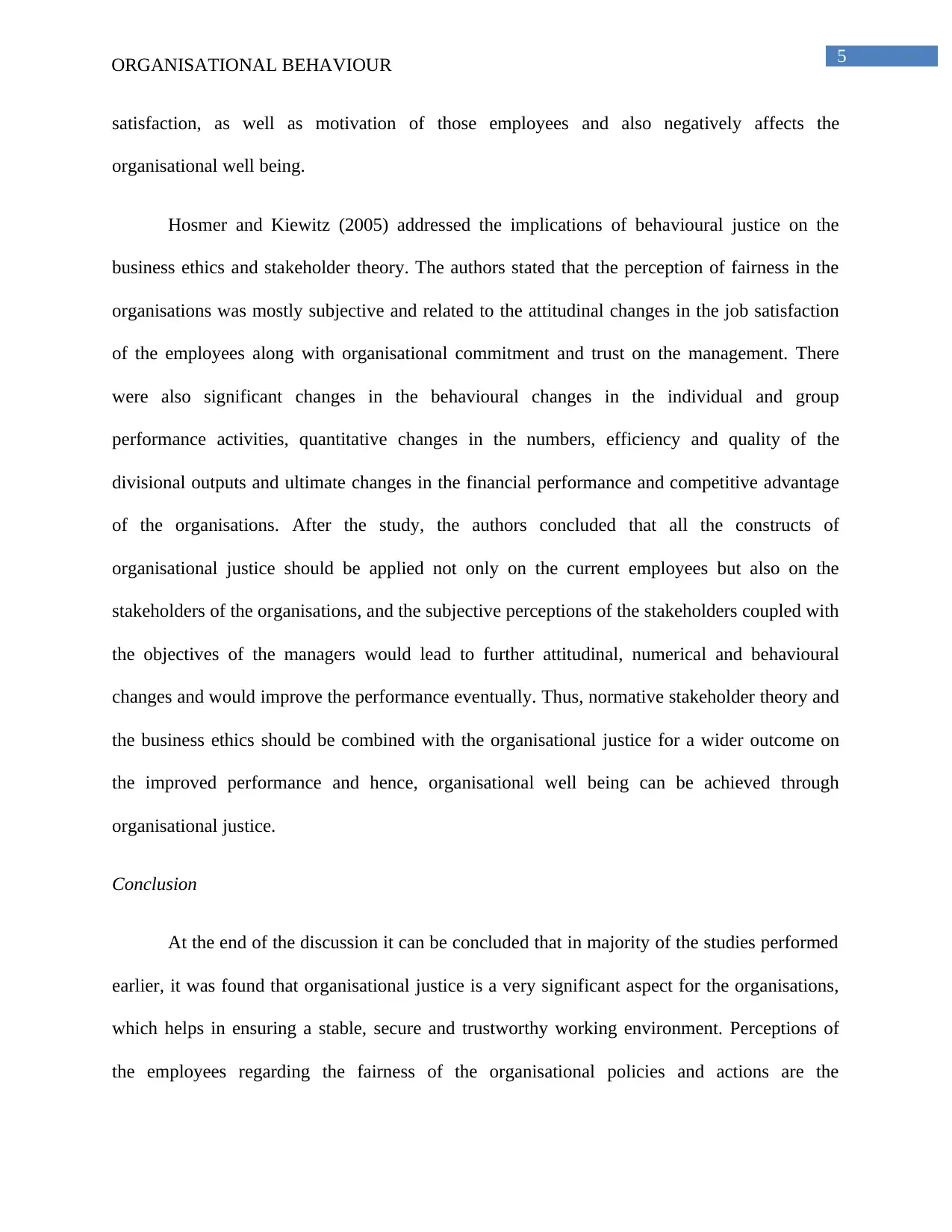
5ORGANISATIONAL BEHAVIOUR
satisfaction, as well as motivation of those employees and also negatively affects the
organisational well being.
Hosmer and Kiewitz (2005) addressed the implications of behavioural justice on the
business ethics and stakeholder theory. The authors stated that the perception of fairness in the
organisations was mostly subjective and related to the attitudinal changes in the job satisfaction
of the employees along with organisational commitment and trust on the management. There
were also significant changes in the behavioural changes in the individual and group
performance activities, quantitative changes in the numbers, efficiency and quality of the
divisional outputs and ultimate changes in the financial performance and competitive advantage
of the organisations. After the study, the authors concluded that all the constructs of
organisational justice should be applied not only on the current employees but also on the
stakeholders of the organisations, and the subjective perceptions of the stakeholders coupled with
the objectives of the managers would lead to further attitudinal, numerical and behavioural
changes and would improve the performance eventually. Thus, normative stakeholder theory and
the business ethics should be combined with the organisational justice for a wider outcome on
the improved performance and hence, organisational well being can be achieved through
organisational justice.
Conclusion
At the end of the discussion it can be concluded that in majority of the studies performed
earlier, it was found that organisational justice is a very significant aspect for the organisations,
which helps in ensuring a stable, secure and trustworthy working environment. Perceptions of
the employees regarding the fairness of the organisational policies and actions are the
satisfaction, as well as motivation of those employees and also negatively affects the
organisational well being.
Hosmer and Kiewitz (2005) addressed the implications of behavioural justice on the
business ethics and stakeholder theory. The authors stated that the perception of fairness in the
organisations was mostly subjective and related to the attitudinal changes in the job satisfaction
of the employees along with organisational commitment and trust on the management. There
were also significant changes in the behavioural changes in the individual and group
performance activities, quantitative changes in the numbers, efficiency and quality of the
divisional outputs and ultimate changes in the financial performance and competitive advantage
of the organisations. After the study, the authors concluded that all the constructs of
organisational justice should be applied not only on the current employees but also on the
stakeholders of the organisations, and the subjective perceptions of the stakeholders coupled with
the objectives of the managers would lead to further attitudinal, numerical and behavioural
changes and would improve the performance eventually. Thus, normative stakeholder theory and
the business ethics should be combined with the organisational justice for a wider outcome on
the improved performance and hence, organisational well being can be achieved through
organisational justice.
Conclusion
At the end of the discussion it can be concluded that in majority of the studies performed
earlier, it was found that organisational justice is a very significant aspect for the organisations,
which helps in ensuring a stable, secure and trustworthy working environment. Perceptions of
the employees regarding the fairness of the organisational policies and actions are the
⊘ This is a preview!⊘
Do you want full access?
Subscribe today to unlock all pages.

Trusted by 1+ million students worldwide
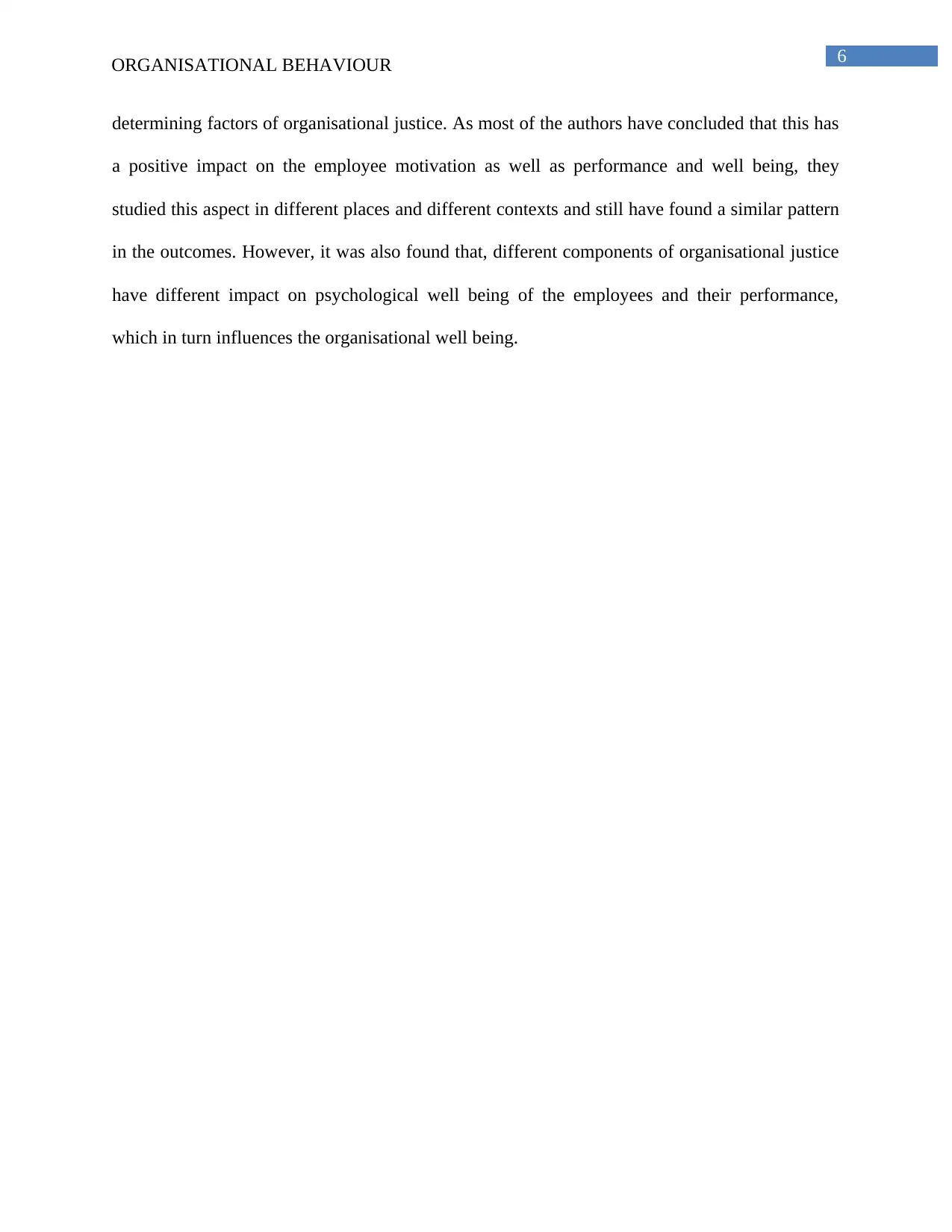
6ORGANISATIONAL BEHAVIOUR
determining factors of organisational justice. As most of the authors have concluded that this has
a positive impact on the employee motivation as well as performance and well being, they
studied this aspect in different places and different contexts and still have found a similar pattern
in the outcomes. However, it was also found that, different components of organisational justice
have different impact on psychological well being of the employees and their performance,
which in turn influences the organisational well being.
determining factors of organisational justice. As most of the authors have concluded that this has
a positive impact on the employee motivation as well as performance and well being, they
studied this aspect in different places and different contexts and still have found a similar pattern
in the outcomes. However, it was also found that, different components of organisational justice
have different impact on psychological well being of the employees and their performance,
which in turn influences the organisational well being.
Paraphrase This Document
Need a fresh take? Get an instant paraphrase of this document with our AI Paraphraser
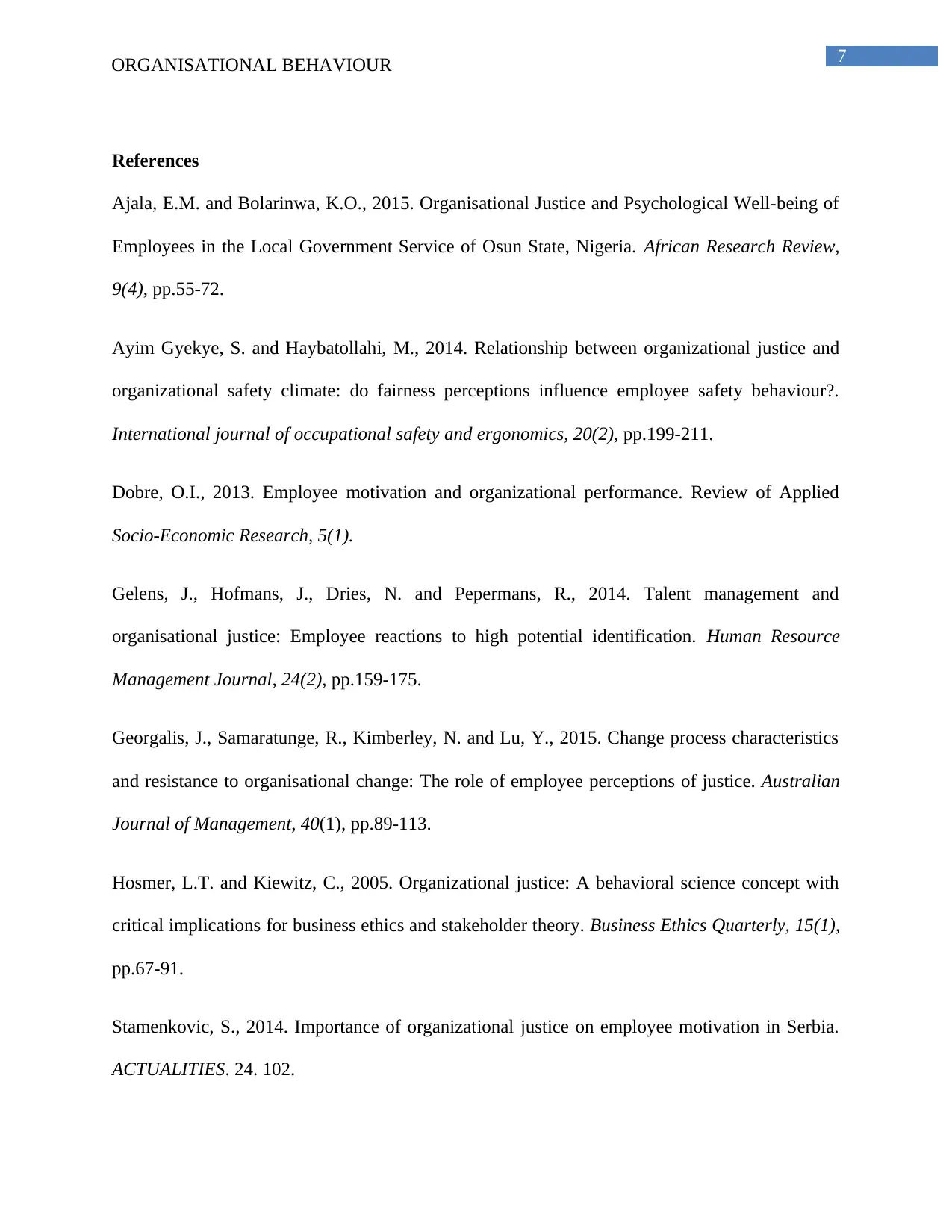
7ORGANISATIONAL BEHAVIOUR
References
Ajala, E.M. and Bolarinwa, K.O., 2015. Organisational Justice and Psychological Well-being of
Employees in the Local Government Service of Osun State, Nigeria. African Research Review,
9(4), pp.55-72.
Ayim Gyekye, S. and Haybatollahi, M., 2014. Relationship between organizational justice and
organizational safety climate: do fairness perceptions influence employee safety behaviour?.
International journal of occupational safety and ergonomics, 20(2), pp.199-211.
Dobre, O.I., 2013. Employee motivation and organizational performance. Review of Applied
Socio-Economic Research, 5(1).
Gelens, J., Hofmans, J., Dries, N. and Pepermans, R., 2014. Talent management and
organisational justice: Employee reactions to high potential identification. Human Resource
Management Journal, 24(2), pp.159-175.
Georgalis, J., Samaratunge, R., Kimberley, N. and Lu, Y., 2015. Change process characteristics
and resistance to organisational change: The role of employee perceptions of justice. Australian
Journal of Management, 40(1), pp.89-113.
Hosmer, L.T. and Kiewitz, C., 2005. Organizational justice: A behavioral science concept with
critical implications for business ethics and stakeholder theory. Business Ethics Quarterly, 15(1),
pp.67-91.
Stamenkovic, S., 2014. Importance of organizational justice on employee motivation in Serbia.
ACTUALITIES. 24. 102.
References
Ajala, E.M. and Bolarinwa, K.O., 2015. Organisational Justice and Psychological Well-being of
Employees in the Local Government Service of Osun State, Nigeria. African Research Review,
9(4), pp.55-72.
Ayim Gyekye, S. and Haybatollahi, M., 2014. Relationship between organizational justice and
organizational safety climate: do fairness perceptions influence employee safety behaviour?.
International journal of occupational safety and ergonomics, 20(2), pp.199-211.
Dobre, O.I., 2013. Employee motivation and organizational performance. Review of Applied
Socio-Economic Research, 5(1).
Gelens, J., Hofmans, J., Dries, N. and Pepermans, R., 2014. Talent management and
organisational justice: Employee reactions to high potential identification. Human Resource
Management Journal, 24(2), pp.159-175.
Georgalis, J., Samaratunge, R., Kimberley, N. and Lu, Y., 2015. Change process characteristics
and resistance to organisational change: The role of employee perceptions of justice. Australian
Journal of Management, 40(1), pp.89-113.
Hosmer, L.T. and Kiewitz, C., 2005. Organizational justice: A behavioral science concept with
critical implications for business ethics and stakeholder theory. Business Ethics Quarterly, 15(1),
pp.67-91.
Stamenkovic, S., 2014. Importance of organizational justice on employee motivation in Serbia.
ACTUALITIES. 24. 102.
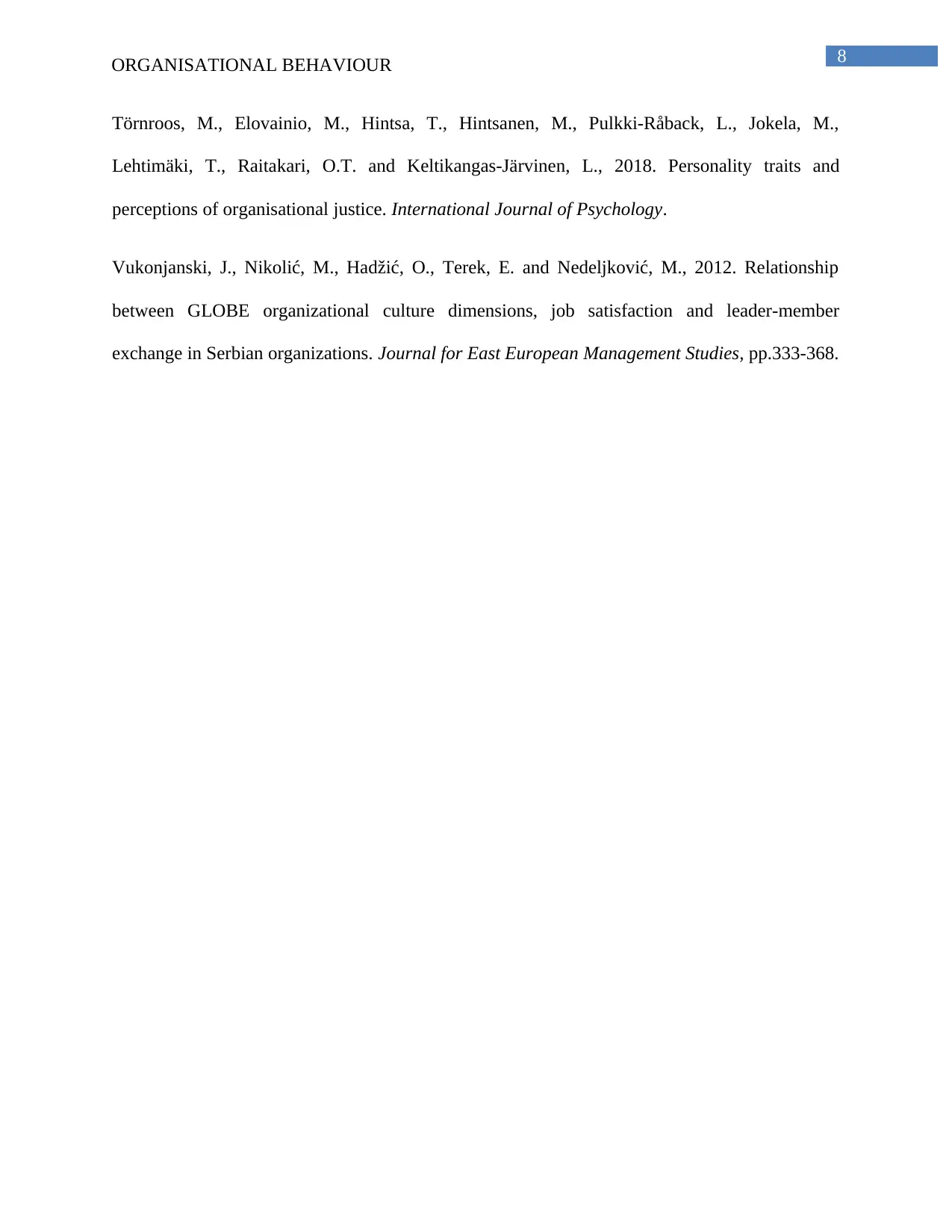
8ORGANISATIONAL BEHAVIOUR
Törnroos, M., Elovainio, M., Hintsa, T., Hintsanen, M., Pulkki‐Råback, L., Jokela, M.,
Lehtimäki, T., Raitakari, O.T. and Keltikangas‐Järvinen, L., 2018. Personality traits and
perceptions of organisational justice. International Journal of Psychology.
Vukonjanski, J., Nikolić, M., Hadžić, O., Terek, E. and Nedeljković, M., 2012. Relationship
between GLOBE organizational culture dimensions, job satisfaction and leader-member
exchange in Serbian organizations. Journal for East European Management Studies, pp.333-368.
Törnroos, M., Elovainio, M., Hintsa, T., Hintsanen, M., Pulkki‐Råback, L., Jokela, M.,
Lehtimäki, T., Raitakari, O.T. and Keltikangas‐Järvinen, L., 2018. Personality traits and
perceptions of organisational justice. International Journal of Psychology.
Vukonjanski, J., Nikolić, M., Hadžić, O., Terek, E. and Nedeljković, M., 2012. Relationship
between GLOBE organizational culture dimensions, job satisfaction and leader-member
exchange in Serbian organizations. Journal for East European Management Studies, pp.333-368.
⊘ This is a preview!⊘
Do you want full access?
Subscribe today to unlock all pages.

Trusted by 1+ million students worldwide
1 out of 9
Related Documents
Your All-in-One AI-Powered Toolkit for Academic Success.
+13062052269
info@desklib.com
Available 24*7 on WhatsApp / Email
![[object Object]](/_next/static/media/star-bottom.7253800d.svg)
Unlock your academic potential
Copyright © 2020–2025 A2Z Services. All Rights Reserved. Developed and managed by ZUCOL.





